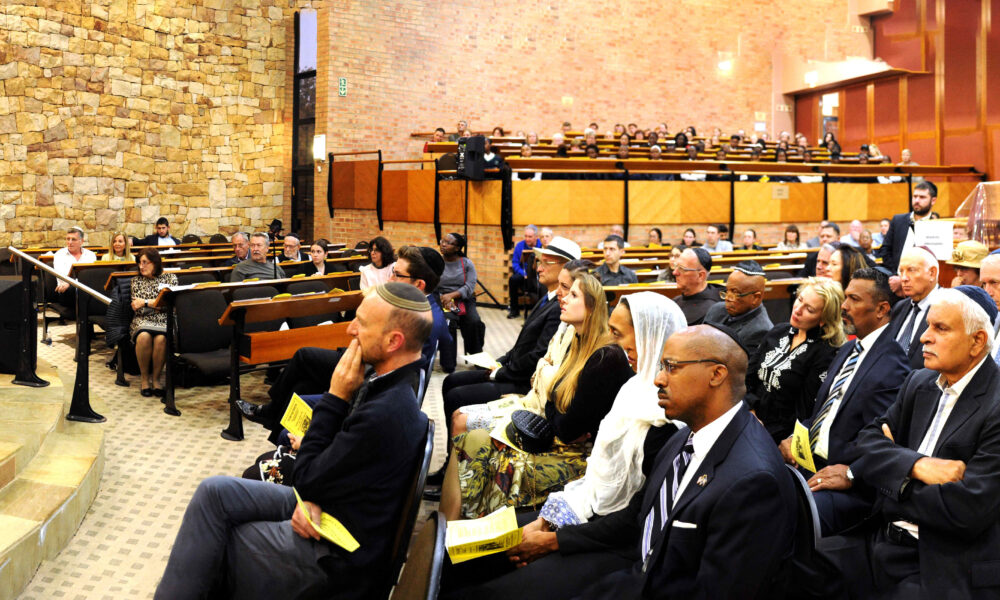Holocaust
‘Never forget, never ignore,’ delegates tell Pretoria Yom Hashoah

“We rose from the ashes of the victims, and we continue,” said Israel’s deputy ambassador to South Africa, Adi Cohen-Hazanov, quoting late Prime Minister Yitzhak Rabin, at the Yom Hashoah commemoration in Pretoria on Sunday, 16 April. “The heroism of the Ghetto fighters was a cornerstone in the establishment of the state of Israel. We continue from those last moments when the hearts of millions of Jews and many others stopped beating. We are the hope and last dream of the six million who are long gone.
“Today, we’re facing constant antisemitic attacks worldwide, and attempts to doubt the legitimacy and sovereignty of the state of Israel, for which we fought for many years and continue to do so,” Cohen-Hazanov said. “This determination makes us all more driven to maintain Israel as an independent and strong country, the cradle of the Jewish nation, and a safe home for every Jew in the world.”
Cohen-Hazanov was one of the number of diplomats, political leaders, Christian Friends of Israel members, and other dignitaries who joined the Pretoria Jewish community at the ceremony held at the Pretoria Hebrew Congregation complex and hosted by the Pretoria Council of the South African Jewish Board of Deputies (SAJBD).
She described how she participated in the memorial ceremony last year held at the killing site in the forest of Ponar, 10km near Vilnius, Lithuania, where she was posted as an Israeli diplomat. It gave her a small glimpse of the last images of more than 70 000 Jews who were brutally murdered in the pits by the Nazis and local collaborators.
During her term in Vilnius, she said she would walk the streets of what was the Jewish ghetto and today stands empty. Cohen-Hazanov spoke of a similar situation in Kaunas, where almost 40 000 Jews were shot to death, as occurred in Kyiv, Warsaw, and Saloniki. All are examples of cities with a rich Jewish history and heritage which was painfully lost as a result of the Nazis’ commitment to systematic annihilation of the Jewish nation.
Dr Doron Goldstein, the chairperson of the Pretoria Council of SAJBD, said that this year’s Yom Hashoah, being the 80th year since the Warsaw Ghetto uprising, is a reminder of fighting for hope against all odds. “We cannot change the past, but by remembering it, we can change the future,” he said. “The greatest achievements in prevention lie in education. In South Africa, in a welcome step, Holocaust education is now included in the school curriculum. It’s also necessary to teach that persecution and discrimination is a universal problem and not restricted to one racial, ethnic, national, or religious group.”
Sam Eichhorn, the vice-chairperson of the South African Union of Jewish Students at Pretoria University (Tuks), said that after his visit to Yad Vashem in 2020, he found it inconceivable to think that a pile of old, dusty shoes could have such a profound effect on someone.
The display of old shoes showed Eichhorn that the Holocaust wasn’t words on a page or footage in a documentary. “It was about people. It was about friends and families and neighbours. It was about doctors and dancers and actors and teachers. It was about children with dreams and parents willing to do everything in their power to see those dreams come to fruition. Those shoes belonged to people. People like you and like me. Yad Vashem taught me that this is what mustn’t be forgotten. That this, speaking as a representative of the Jewish youth, is what will soon become our responsibility to carry. To pass on. To ensure that every generation will know,” he said.
“Building and preserving our communities is the greatest challenge our youth will face as we begin to fill more positions of leadership and attempt to fill the large shoes of our predecessors,” Eichhorn said, imploring the younger generation to come forward and form the backbone of our greatest tool, our community.
The deputy head of mission of the Austrian Embassy, Oliver Grunbacher, said Austria took full responsibility for the crimes many Austrians committed or collaborated in during the Holocaust. That’s why it changed its citizen law in 2019, making it possible for the descendants of those who had to flee from Austria during the Nazi regime to claim Austrian citizenship. Grunbacher emphasised the importance of staying vigilant at all times, and never giving way to antisemitism, as well as speaking up and protesting whenever the Holocaust is questioned.
Going into great detail at times, Holocaust survivor Irene Fainman was blunt in telling of her time in the Ravensbrück Women’s Camp, but concluded that she refuses to live with hate which, like a cancer, can consume one, although she would never forgive or forget.